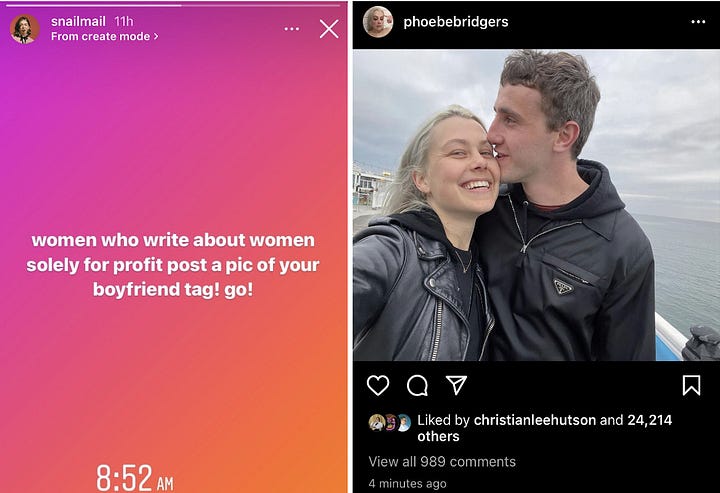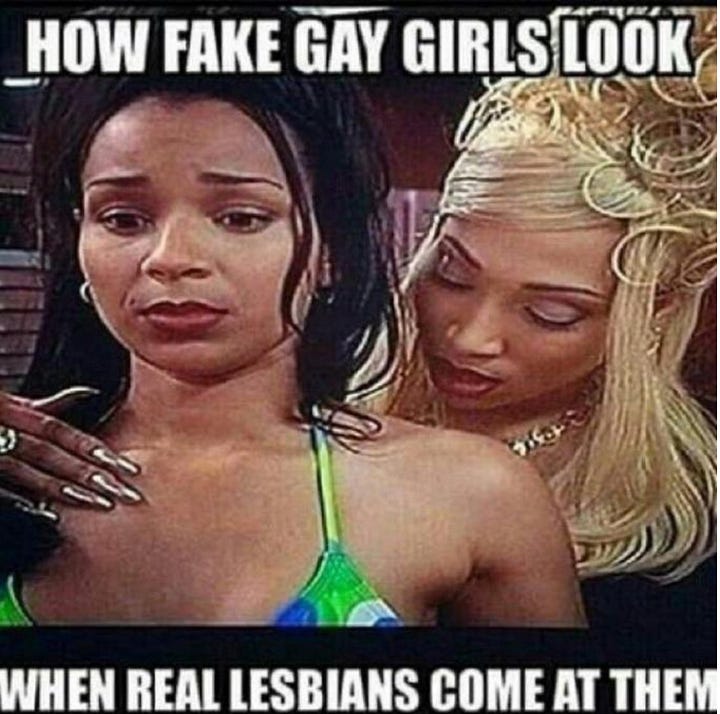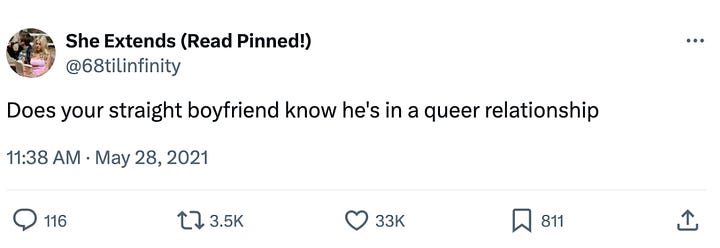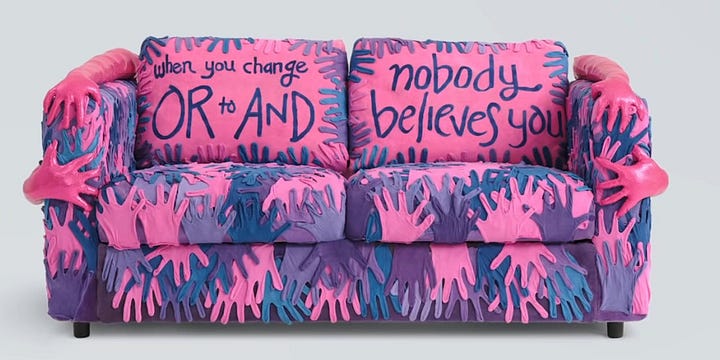Bi Discourse
Happy Bi Visibility Day! Here's some thoughts I've been having lately on being bisexual, being online, and ultimately about how what we consume consumes us back
I. Bisexuals Aren’t Real… Are They?
Most of us are old enough to remember the stigma around bisexuals that was rampant in the 2000s and early 2010s. Beloved TV Rom-Com heroines like Carrie Bradshaw or Jessica Day dismissed potential love interests on the grounds that his bisexuality was an obvious deal breaker. Glee, a show considered groundbreaking in its queer representation, was ripe with biphobia. The phrase “pick a side” was thrown around a lot. The general feeling was that women claiming to be bi are doing it for attention, and men claiming to be bi are doing it to avoid calling themselves gay. In other words, anyone claiming to be bisexual is lying about their attraction to women.
It makes sense that I bought into this ethos whole heartedly while growing up. I was peppered with biphobia even when outside of the realm of TV (where I did spend a significant amount of time). I was 11 years old sitting in a sticky diner booth waiting for our food to arrive when my mother told me in no uncertain terms that bisexuality wasn’t real. She warned me to never date a [scare quotes] “bisexual” man, because he would never choose me over another man. One day in 10th grade, as her mom drove us home from school, my close friend declared that she herself would never date a bisexual man. She said it was dangerous, because the hypothetical bi man could give her AIDS.
So, that was how I saw the world. Bisexuals are fake. It’s not real. Merely a fabrication by the truly desperate and despondent. Anyone claiming as such should stop being such a fucking loser, and get their attention some other way. It was obvious then, that as a young girl who liked boys, I had to be straight. I had to be.
And, of course, it didn’t make any sense to me when I then had feelings for girls. I felt wrong. I felt like the only explanation was I was some freak, an overly sex-obsessed pervert. I was ashamed. I repressed as best as I could, accepting attention from any boy that would give it to me. It’s not like I didn’t like any of them, or I didn’t enjoy hooking up with (some of) them, but it was an over correction. I dove head first into being “boy crazy” so that there was no room for anything else.
But of course, denial only went so far. One sleepover I admitted to a couple of my closest friends “sometimes I think I could be a lesbian,” quickly adding “but definitely not because I have crushes on boys.” Then the very next sentence, “And I know being bisexual is fake, I’m not saying that.” I don’t really remember their reply, but whatever they said, I don’t think they disagreed.
I’ll spare most details as they’re not super germane to this essay, but during my freshman year of college I became friends with other queer people for the very first time, and it led me to accept that a lot of people are attracted to more than one gender. And eventually I came around to accepting this about myself as well.
When I finally came out to my mom, she told me that she still loves me no matter what (yay! Right thing to say!) and that “it’s okay to be confused.” (boo!!! Wrong thing to say!!!) (I’ll just add that she’s very accepting now, as to not completely assassinate her character on the internet lol). This was very upsetting to me at the time. I wasn’t confused. I was confused for the last 18-ish years. I’d finally got some clarity, and here it was being twisted and warped right in front of me. She didn’t believe me.
II. They’re Just Doing It For Attention
Hannah Einbinder has a joke from her stand up special, Hannah Einbinder: Everything Must Go (2024): “Bisexuals, everybody wants us, but no one wants us. The straights don’t claim us. The queers certainly don’t claim us… How else can I say this? Bisexuals are the Jews of the LGBTQIA+ community… everybody’s like ‘Ugh bisexuals. They’re just shape-shifting maniacal villains. They’re not one of us!’ Ring a bell, Jews?” Like all stand up comedy, it’s an outrageous statement heightened to an absurd degree, but what makes it funny is it’s based on a kernel of truth.
I don’t see much content online about bi men, but we also don’t see too many bi men. The reasons bi men wouldn’t want to come out are perhaps obvious within the framework of patriarchal oppression, thus I won’t spell them out here, but know that is also a key piece in all this.
Conversely, I see social media posts all the time where bisexual women are the butt of the joke. And I’m willing to gamble that some of you do too. Look, maybe I’m being too sensitive. Maybe I’m taking memes too seriously and I need to find a better sense of humor. I’m not saying that’s not happening. Actually, when I first started seeing this content, my first instinct was to laugh along with it. “Yeah, bisexuals are so annoying,” and the like. However, lately, I’m more turned off by them than I’m proud to admit.
Although, I won’t pretend to be naïve, I know there is definitely some online behavior that is downright weird, and does deserve to be shamed in the town square. For example, a trend I see often is bisexual women desperately attempting to label their straight boyfriend as “fruity,” which is ultimately more offensive than I’m prepared to explain in this essay. And this cringe behavior leaves me, a bisexual woman with a straight boyfriend, feeling horribly embarrassed and doubting if I’m even valid to feel offended by what I perceive to be online “biphobia.” I’m left wondering why would they post like this, and the only answer I can come up with is that they’re trying to prove themselves to strangers.
Biphobia is so often a conversation about representation, visibility, and inclusion (case-in-point I suppose!). Meanwhile, homophobia and (especially) transphobia are often conversations about human rights. One problem is lack of attention, and the other is “we’re getting murdered.” (Which is not to say that bisexual people are never victims of hate crimes.) Most partnered bisexuals are not in same sex relationships, and therefore, are less often targets of the systemic oppression that most other members of the LGBTQ+ community face. So what, then, is the problem with finding some humor in bisexuals begging for attention?
Something I don’t think many people are aware of is that, on average, bisexuals have poorer emotional health, mental health, and social functioning than their lesbian, gay, and straight counterparts. One study showed that bisexuals in college are likely to have fewer close friends, and are less likely to have a mentor they feel they can ask for help when compared to gay, lesbian and heterosexual individuals. And according to the Pew Research Center, bisexuals are far less likely to be out than their gay and lesbian counterparts. Only 19% of bisexuals surveyed report that their closest loved ones know about their bisexual identity - compare that to 75% in gay and lesbian individuals.
Granted, that’s probably not because of tweets and memes. And, who knows, maybe bisexual people are just all born to be socially anxious little weirdos -- we can’t rule it out completely! But there is real hurt -- isolation, loneliness, and exclusion -- happening in the bisexual community. Maybe the histrionic pleas for recognition we see online are real cries for help that deserve to be taken seriously.
I’ll end by saying this - since I came out I’ve surrounded myself with queer friends who love and respect me, and do not participate in discourse over whether or not I can go to a Chappell Roan concert with my boyfriend. I’ve never had to prove myself to the queer people in my real life, and they’ve always believed me. Maybe I just gotta log off more, huh?





I feel like I’ve never even heard the words “bisexual” and “community” together in one phrase which speaks to what you’re grappling with in this piece. Ironic divisiveness and exclusion translates to real shame. I hope bisexuality is shouted instead of whispered!!